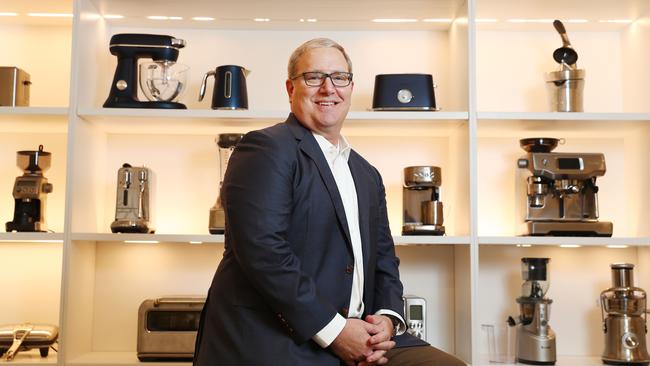Breville lifts revenue, profit but US price hikes loom
Breville shares sank after it flagged price hikes in the US on the back of new tariffs on its China-made kitchen appliances.

Shares in Breville lost as much as 5 per cent in Thursday trade after the kitchen appliance maker flagged price hikes in its key US market on the back of Donald Trump’s new tariffs.
The company, which manufactures everything from kettles to pizza ovens and is famed for its coffee makers, has already been impacted by the US-China trade war, with 10 per cent of products already carrying a 25 per cent tariff.
But additional tariffs set to be imposed between now and the end of the calendar year will mean the majority of Breville’s products are hit by tariffs, leaving just 15 per cent of its Chinese imports to the US unaffected.
The company’s chief executive Jim Clayton told The Australian that he expects to lift prices in the US on some products this year but on how many products, and when, could change depending on how trade negotiations progress.
“Right now the only thing that appears certain is that about 30 per cent of our products will pick up a 10 per cent tariff in September,” he said.
At 12.15pm (AEST) shares in Breville had fallen 4.3 per cent to $18.55, despite the company unveiling a full-year result in line with consensus expectations, with net profit after tax attributable to shareholders up 15.2 per cent to $67.4 million for the year through June 30.
Earnings before interest, tax, depreciation and amortisation shot up 13.7 per cent to nearly $114m and the company declared a final dividend of 18.5 cents per share 30 per cent franked, up from 16.5c a year ago.
Still, the share price loss came as the ASX 200 slumped on the back of a drop on Wall Street overnight amid fears of a US recession.
It also came after Breville said that adverse changes to the general global economic and geopolitical conditions would impact its financial results in the year ahead.
While 20 weeks worth of Breville inventory is currently stored in the UK ready to mitigate any impact of a Brexit outcome, the company still expects consumer demand to waver and supply to be disrupted when the UK leaves the European Union.
The company delivered a full-year revenue spike partly on the back of a rapid expansion in its European business and a strong performance in the US, which offset weaker export sales to Russia.
Its rapidly expanding geographic footprint in Europe was already two thirds the size of the Australia and New Zealand business.
“We continued to deliver double digit earnings before interest and tax growth while successfully executing on our acceleration program, increasing our investment in product development and marketing, and geographically expanding in Germany, Austria, Benelux and Switzerland,” Mr Clayton said.
Breville said Germany posted a successful first full-year and delivered a stronger revenue in its first year than the UK did in its fourth year of operations.
Earnings before interest and tax growth accelerated to 12 per cent, up from 10 per cent a year ago, though margins were slightly lower, reflecting the strengthening US dollar, as well as an increase in marketing and product development investment.
The company is set to enter Spain and France this financial year, with plans to further leverage the already established European warehousing, logistics, customer service and back office functions, as well as the fact that many of the retailers are already customers.
“I think it’s a good time to come into Southern Europe as the company that can bring the third wave of (better quality) coffee into your house,” Mr Clayton said.
“It’s got a long road ahead of it in terms of consumers learning that coffee doesn’t have to taste bad. Right now they don’t know that.”



To join the conversation, please log in. Don't have an account? Register
Join the conversation, you are commenting as Logout